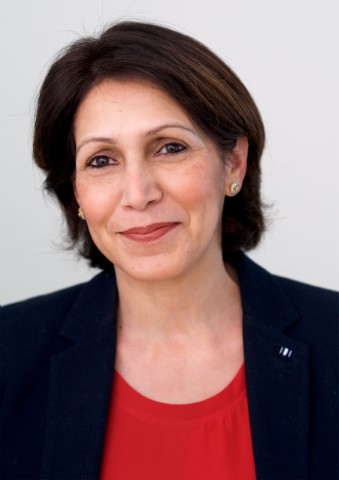For the latest edition of AmCham’s International Leadership Interview Series, we sat down with Roche Norge General Manager and AmCham Board Member Rajji Mehdwan. Through a globe spanning career that has included stops in several European countries and the United States, Mehdwan has developed a keen sense of what it takes to be an international leader, a sense that has helped her and Roche improve the lives of patients across the world.
Where did you start? International experiences? Can you please give a brief description of how you got to where you are now?
I grew up in India but have since lived and worked in many different countries. I trained as a registered nurse and practiced at the Royal Free Hospital in London. I got to know the English patient care side well, which was pretty cool.
My goal at that time was to get more into hospital administration, but that wasn’t possible because I didn’t have a business background, which led me to business school in the US, followed by many interesting roles in management consulting, opening a startup, and working on the development side at Johnson and Johnson.
I had always admired Genentech (a member of the Roche Group). I remember watching a TV-program where Genentech, along with some doctors in Boston, had figured out a way to starve tumors. Tumors, like anything else, need to feed, if you think of them as an organism. So, these researchers at Genentech had figured out a way to cut off the blood supply to tumors and the tumor then starves and dies.
Watching this super high-tech, cool science was so inspirational. I remember thinking, “Wow, one day I’d love to work for this company.” Call it fate, a role opened up with Genentech a couple years later and I’ve never looked back since. That was eight years ago!

What are the important decisions you make as a leader of your organization and how do they impact its global presence? Share any recent examples?
I spend a lot of time reflecting on our long-term vision and strategy, thinking particularly about “What is our purpose?” and, “What impact do we want to have long term?”
For example, the personalization of healthcare is becoming more and more of a reality. Roche has a lot to contribute in regard to accelerating the personalized healthcare environment in Norway. One of the decisions we have recently made is to proactively reach out to public stakeholders and encourage co-creation and collaboration to accelerate the capture of meaningful data at scale. Meaningful data, including treatment data and comprehensive genomic data, will be critical in informing patient care, research, and development – and also help us make the system more efficient. Roche with its diagnostics capabilities, technology capabilities via companies such as Flatiron and Foundation Medicine, and our pharmaceutical arm can really bring a lot of expertise and knowledge to the table to help accelerate personalized healthcare in Norway.

As an expat, I have had to remind myself that I am the one dropping into a new culture. The culture shouldn’t change to adjust to me, I need to adjust to the culture. You need to come in with a lot of respect for how Norwegians engage, how they do business, and how they are as people.
How do you build team morale and maintain the creativity of a diverse team within an international organization?
I believe people feel good when they are in an environment where they know ‘great things are happening,’ so I always start here. Roche is the biggest biotechnology company in oncology. We have one of the deepest pipelines. We’re in the business of bringing really meaningful medicines into diseases where there is high unmet need and our medicines can truly make a difference to people. This really excites the team in Norway.
We place an incredible focus on people at Roche. We spend a lot of time making sure our people have the right tools, have good training, and feel supported, empowered, and developed. The moment people feel that you have their back, that you care about their development – they give their best.
Would you use the same leadership style in a different organization? In a different country? How important is it to tailor your leadership style to your team and environment?
Yes and no. I believe no matter where you work you should be true to your leadership style. So that stays consistent. I tend to believe in the ‘servant leadership’ philosophy – my job as a leader is to be of service to my people. As an expat, I have had to remind myself that I am the one dropping into a new culture. The culture shouldn’t change to adjust to me, I need to adjust to the culture. You need to come in with a lot of respect for how Norwegians engage, how they do business, and how they are as people.
Where do new ideas and exciting proposals come from in your organization? Has your international experience helped you ‘think outside the box’ in your organization?
Ideas come from everywhere. We emphasize an organization where everyone has a voice. We’ve organized our business around different disease areas via multiple cross-functional teams. This cross-functional nature allows for a lot of creativity.
I believe my international experience helps as I am able to act as the ‘connector.’ At Roche, we are 110+ countries, 93,000 employees. If you have a problem, there are 93,000 people you can tap into for solutions!

We’re living in an uncertain world where things are happening fast. Technology is exploding, our understanding of disease and science is increasing rapidly. We don’t have time to work on something for a year – it’s obsolete by the time you launch it. Agility will be key to success
How do you ensure that your team and your company’s services are aligned to your company’s core vision?
At Roche our north star is to deliver better outcomes to more patients faster. I spend a lot of time providing clarity on our vision, our purpose, and the why. I believe once people understand the why, the relevance to them, and that they have something of value to contribute – great things happen!
What do you believe are shared traits among leaders? Any common mistakes? What is unique about being a leader in Norway compared to leading an organization in another country?
Strategy and vision. Your job is to set the tone, and you need to be very crystal clear on the direction of the company. Good leaders are also open, transparent, and authentic – I find people respond to that.
Common mistakes – As I said earlier, I have seen leaders who come in and don’t respect the culture. That can lead to a lot of problems
How do you continue growing and developing as a leader?
To grow I believe asking for feedback is critical. I often ask my team “What can I do better? What concerns you?” I also learn from making mistakes. I make many of them! But that is how you learn.
You get the podium at Stortinget for five minutes, what topic(s) do you address and why?
How do we collectively ensure sustainability of our great healthcare system, where our patients get the best care and medicines when they need them most?
Norway has a great healthcare system when I compare it to other countries. I come from India, where healthcare is still largely for the rich.
Norway has a very ambitious political agenda to provide the best healthcare for its people. For medicines, the ambition emphasizes speed and faster access to new medicines. However, in the implementation of this vision, the decisions that are being made today by budget holders are not delivering on the political ambitions.
In 2018, over 50% of new medicines got a no from Beslutningsforum. Cost, or budget impact, is the main driver of decisions. Medicines that have proven cost effective by the Norwegian medicines agency are still getting a no. Decision criteria are unpredictable, and often decisions are made on subjective criteria. In reality, the impact of all of this is that Norwegian patients do not have access to as many new and cutting-edge medicines as their neighbors in the Nordics and Europe. Norwegian patients are being given sub-optimal medicines, in some cases, due to economic reasons, and Norway has one of the highest times to market for new medicines, per the latest EFPIA report.
My question for Stortinget is: Do we want Norway to continue to lead as a healthcare system, or are we okay being one of the slowest markets in Europe to give access to new products?
If we look at Germany as an example – patients come first. Patients have access to medicines right after regulatory approval, then the government negotiates with companies on price. And the Germans still manage to negotiate very well. They make it work – so can we!
Patient voice is being lost in Norway. I acknowledge that budget holders have good intentions and a tough job trying to balance patient needs and costs. My ask of parliament is – let’s solve this disconnect between political ambition and budget holders/decision makers so their decisions actually implement the political ambition we have.
In the best healthcare systems that I’ve seen in the world, there is a partnership mindset between the government and industry. I would encourage us to do the same.

Decision criteria are unpredictable, and often decisions are made on subjective criteria. In reality, the impact of all of this is that Norwegian patients do not have access to as many new and cutting-edge medicines as their neighbors in the Nordics and Europe.
What do you see in the next generation of leaders aspiring to run an international organization? Advice to them?
Agility will be the key to success. We’re living in an uncertain world where things are happening fast. Technology is exploding, our understanding of disease and science is increasing rapidly. We don’t have time to work on something for a year – it’s obsolete by the time you launch it.
What is the latest time you responded to an email last night?
Last night it was pretty good, so 10 PM! I’m a bit of a workaholic, working on this!
Functional Always active
Preferences
Statistics
Marketing
tel.: +47 22 41 50 10 | amcham@amcham.no | Sitemap | Privacy Policy | Designed by Flagship
AmCham © 2025
